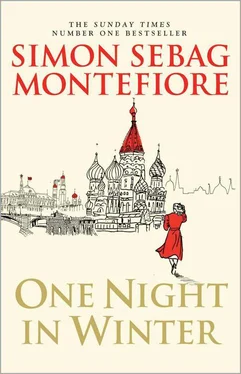‘I apologize, Lavrenti Pavlovich,’ said Kobylov, bowing slightly.
‘Comrade Stalin will want a report tonight. But don’t rush so much, Bull. That’s how we make mistakes. Things take as long as they take.’ Beria glanced at Mogilchuk. ‘What happened to your lip?’
‘I banged it on a door.’
Beria laughed. ‘I can see the imprint of Kobylov’s rings. But don’t blame your subordinates, Bull. It was your theory, right? Professor Schpigelglaz, where are you?’
‘Here!’ trilled an adenoidal voice with a Yiddish accent. ‘Stwaightforward, very stwaightforward, comrades.’ Beria stepped aside to reveal Professor Schpigelglaz, whose angular glasses with huge black frames dwarfed his beaky face. He had a white coat and a cloud of frizzy white hair to match.
The professor was such a wraith that he had been entirely concealed by Beria’s paunchy bulk. ‘Gentlemen, I have something to show you.’
‘Get it right,’ Beria said, ‘and you go back to your cushy sharashka laboratory. Get it wrong and you’ll be hauling logs in the Arctic.’
‘Ach, no danger of that!’ Professor Schpigelglaz seemed delighted to have such an interesting case. ‘May I pwoceed? Now, let’s roll out our young overnight guests. That’s what we call them here – overnight guests.’ He gestured to a hollow-eyed young man who looked as if he had spent too much time in the company of the dead. The assistant opened the steel doors to pull out a metal platform on which lay the waxy naked body of a male red-haired teenager. As the platform came out, wheeled legs dropped down from it, enabling the hollow-eyed young man to push the trolley alongside one of the slabs. Then he and another assistant lifted it on to the slab.
‘Let’s see now, gentlemen.’ Kobylov enjoyed being addressed as a gentleman – the professor talked as if the Revolution had never happened and he and Beria were a pair of aristocratic generals. ‘Who are our overnight guests? Ach ya. Blagov, Nikolasha. Eighteen years old,’ said the professor, reading from a label tied to the big toe.
The body looked to Kobylov as if it had been filleted: jagged red lines – like railways on a map of flesh or a zip made of skin – ran around the hairline of the head and from the throat down the centre of the chest to split at the waist. All was clean and neat – except the jaw and mouth. All the cleaning in the world could not put that together again. The assistants then returned to the steel doors. This time a naked female body was laid on the other slab. Again, a label on the toe.
‘Shako, Rosa. Eighteen years old.’
Beria whistled through his teeth, looking at the teenage girl. ‘Shame we didn’t get to her when she was alive, eh, Bull?’
‘Not my type,’ said Kobylov, grinning. ‘A little dainty for me.’
Beria turned to the professor. ‘Start with the boy,’ he instructed.
‘Ach yes, Lavrenti Pavlovich. Well, it’s quite obvious when you examine the wounds. The boy has a diwect bullet wound fired from a Mauser service revolver. One shot.’ He leaned over Nikolasha’s face. ‘There’s the entwy wound in the mouth which shattered the jaw and passed through the cwanial chamber, causing catastwophic twauma.’ He twisted the boy’s head with its slicked-back red hair, ‘And here’s the exit wound, back of the head. Death instantaneous.’
‘And the girl?’ said Beria.
‘Ach yes, the girl.’ He crossed to the other slab. ‘Here on the right breast, gentlemen, we see a single shot to the heart. Vewy neat. We dug out the bullet. Here it is. You may keep it, dear genewal, as a memento of me, ha ha. Yes, a standard service revolver was used. Mauser. Death also instantaneous.’
‘There it is,’ said Beria.
‘So he shot her and then himself? Like I said?’ said Kobylov.
‘Please enlighten my blockheaded comrade, professor,’ Beria said.
‘All right, gentlemen. Nikolasha Blagov was killed by a shot fired at about seven metres. You see the wound.’ He leaned over the slab until he was very close to the shattered mouth. ‘No powder burns. Now look at her wound.’ He switched to the other slab with surprising agility. ‘Look! Hers is blackened quite clearly awound the edges. Her wound is point-blank. It was she who killed him and then herself. She made a mess of him, but as is typical of a female suicide: one shot to the heart. A lady likes a tidy house, yes? Her face is immaculate. You see, stwaightforward, all very stwaightforward.’
‘Thank you, professor.’ Beria looked at Kobylov and Mogilchuk and opened his hands: ‘You got it the wrong way round, you imbeciles. Remember the dead are a marshal’s daughter and a deputy minister’s son. Remember whose children we’ve arrested. Get a move on or you’ll find yourself guarding scum in Kolyma. The Instantsiya is impatient.’ He turned away from them, rubbing his hands. ‘Now, I’ve got a girl waiting who’s good enough to eat! Fresh as summer strawberries. And then a game of netball with the guards.’
He swept out of the morgue, followed by Colonel Nadaraia and the other bodyguards.
‘What energy Comrade Beria has,’ murmured Kobylov. ‘And what a brain. Every moment of every day is organized as precisely as a Swiss watch. We are pygmies beside him. Come on, Mogilchuk, let’s return to our school games.’
TAMARA HAD SCARCELY spoken to Hercules in their apartment. Was it bugged? He thought so. She couldn’t speak to him in the car because of the guards; nor at the Golden Gates.
So, most unusually, after drop-off at the school, she said, ‘I need to talk to you.’
‘Do you have time to walk with me to Alexandrovsky Gardens?’ Satinov asked her.
Tamara did not have a class until ten so they walked towards the Kremlin in silence. That day Hercules was not in uniform but a summer suit, with a white fedora low over his eyes, and Tamara thought what a handsome man he was.
Two guards walked ahead, Losha behind, and their car purred twenty metres behind them. The summer blizzard of gossamer seeds swirled around them. Young soldiers, a girl in naval uniform, pensioners in cloth caps walked the streets, eyes half closed, cushioned by the soft, easy air. Tamara noticed how sometimes these sleepwalking members of the public were jolted awake with the spark of recognition. ‘Wasn’t that…?’ they asked their companions as they passed Satinov.
If only they knew that our life isn’t as easy as it appears, Tamara thought.
Having checked everyone was out of earshot, she put her hand through Satinov’s arm. Ever since George had disappeared, she had longed to talk to him.
She adored her Hercules. Amongst those coarse, hard-drinking leaders, with their fat, depressed wives and spoilt, disturbed children, Tamara’s friends would often say, ‘If only I had a husband like Satinov. Tamara, you’re so lucky,’ and she would reply, ‘He’s a wonderful husband but I just wish he talked to me more…’
Despite their years together, she found it hard to breathe around his coldness, his detachment. Why didn’t he cuddle her? Why couldn’t she be with a man who talked to her and told her about his day? It had been the same when his eldest son Vanya was killed. She wanted to shriek and tear her clothes – but he just seemed to absorb it. She wondered if he really wasn’t that deep, if he was simply uncomplicated or, worse, flinthearted? He had cried once, but afterwards he just said to her, ‘The whole Motherland is weeping, Tamriko. We’re no different.’ And he had returned to the front, leaving her to comfort the other children. Now his son was in prison and still she could not reach him.
‘Hercules, is there any news of George?’ she asked now.
Читать дальше












